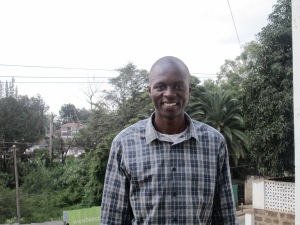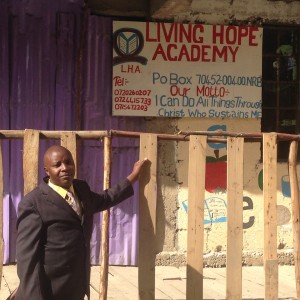A conversation with Mike will instantly reveal that he is a man driven by compassion and a desire to do right by others. His work through the Tatua Fellowship is the latest in his growing legacy of commitments to his community, and certainly, this will not be the last time that we shall see Mike leading change.

Michael Owino Odee is a self-declared extrovert and workaholic: qualities that he believes brought him to community work. “Talking a lot really exposes the world to you,” he shares, “When you sit down with people, and really take the time to listen to the problems their facing or their reflections on their community, you learn a lot about what it takes to secure progress.”
And certainly, the more he has talked, the more Mike has centered his own life on others. In addition to managing a small but diverse farm in his Kikuyu home area; Mike is an active volunteer with the Kenyan Red Cross, alongside his commitments to Tatua. Not to mention of course, being a husband and father. “I hate wasting time,” Mike explains breezily when we question how he finds the time for it all.
For the Tatua Fellowship, Mike is working on a campaign that aims to address the problem of youth alcoholism and drug abuse in his home community, Kikuyu. The consequences of this problem are clear, Mike tells us: youth unproductivity, insecurity, and an increase in the number attacks on women are some of the problems he says can be linked to youth alcoholism in his community.
“Many people see the problem but the general reaction is, ‘That’s someone else’s life, why should I get involved,’” explains Mike, “That’s what spurred me to take on this campaign; the sense that there was a community spirit that was missing.”
But bringing the community-organizing framework to this work has not been easy. “Campaigning is hard,” admitted Mike, “Our culture is very resource-centered and so often, no monetary resources means little to no support. A lot of people question how change can be made without a large financial sponsor driving that change; and that can be incredibly frustrating.” However, Mike refuses to let these challenges deter him. He remains excited about the prospect of stirring action in Kikuyu, and affirms his belief in the ability of community organizing practices to awaken participation.
In spite of the challenges, Mike remains energized by his love for his home, “I love walking around villages in Kikuyu. The purity of the air and the beauty of all the forest cover are incredible natural therapy.”
Join us in supporting Mike and our other incredible fellows as they build power in their communities. Fill out this form for updates and information about how you can get involved.

